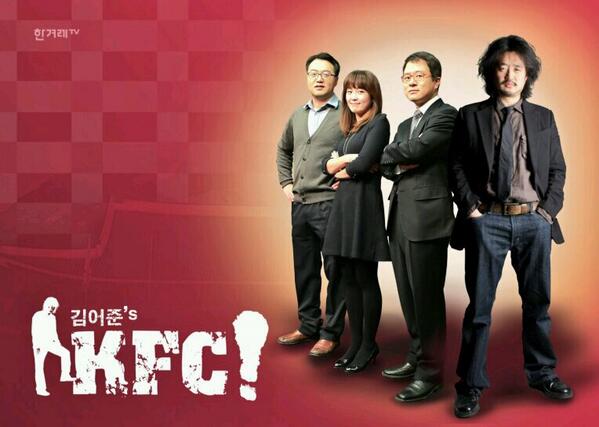Kim Ou-joon is a satirist and prominent critic of the administration of former South Korean President Lee Myung-bak, and was the driving force behind the groundbreaking podcast “Naneun Ggomsuda“. In March, he returned to the airwaves after being acquitted on charges of defaming President Park Geun-hye last fall. His new show, “KFC” [ko] (supposedly named in reference to one the of president's nicknames being “Chicken”) has begun airing regularly on Hankyoreh TV, and marks the next test in determining how much leeway the Park administration will give to its critics.
Although South Korea is widely regarded as one of the leading democracies in Asia, recent criticism from a variety of international human rights organizations over the government’s treatment of dissenting voices has led to concerns that the country is lagging behind other nations in freedom of expression.
In particular, criminal defamation laws remain a powerful weapon in government suppression of free speech, a point made repeatedly in a 2011 report from the UN Special Rapporteur on Human Rights and Reporters Without Borders. According to a report from UC San Diego professors Stephan Haggard and Jong-sung You, criminal defamation cases have increased five-fold, from roughly 2,000 annual cases at the end of the Kim Dae-jung administration to over 10,000 at the end of the Lee presidency.
This rise in defamation indictments has corresponded with a dramatic uptick in the amount of web content blocked or deleted by the government’s internet regulation body, the Korea Communications and Standards Commission (KCSC). Figures easily accessed on the KCSC website show that the removal of objectionable content – which covers a range of categories from obscenity and defamation to national security issues – has skyrocketed since the agency’s creation, from roughly 10,000 blocked or deleted websites and Internet postings in 2008 to more than 85,000 in 2013. Much of this activity has been conducted in accordance with the country’s Network Act, which broadly defines “illegal online content” and criminalizes the online circulation of “unlawful information.”
In addition to disturbing trends regarding criminal defamation and Internet regulation (some might say censorship), indictments under the country’s controversial National Security Law have begun to inch upward, from 32 in 2008 to 103 last year [ko]. A rise in Cold War-era rhetoric has revived national security as a salient issue in Korean politics and forced critics on the left to be more careful about what they say lest they be branded “pro-North Korea sympathizers‘.
In 2012, Amnesty International issued a scathing report about the National Security Law, correctly pointing out that the vague and arbitrary nature of the use of Article 7 produces a chilling effect on those who question government policy. This clause forbids praising the North Korean leadership, joining an “anti-government” organization, engaging in anti-state activities, or possessing or distributing North Korean media or literature. The fact that many of these critics are now being charged under defamation statutes rather than National Security Law violations is small consolation.
So far, many of the president's critics have been wary of her position on these issues, and she has done little to assuage these concerns. As 2013 drew to a close, the country was wracked by a series of strikes, mainly over fears that the government was planning to privatize a new rail line. Alluding to the causes of the strike, the president blamed social media for spreading “wild rumors”and stated that the government had to act “quickly and aggressively against groups who distort the situation”. The fact that this statement was made a day after the government’s official broadcast regulation arm targeted several media outlets – including the online sites Gobal and Newstapa – for producing reports which the agency termed “not real news” raised fears that the government may be preparing to step up its efforts to regulate both Internet content and broadcast media.
It remains to be seen how aggressive the president will be in targeting critics of her administration. In that sense, the KFC host, who has already drawn Park’s ire once earlier in her term, may now be playing the role of another type of bird: the canary in the coal mine.




No comments:
Post a Comment